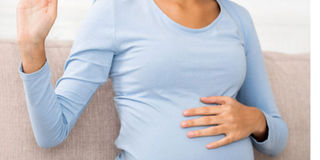When a baby dies suddenly

To reduce the risk of SIDS, a pregnant woman is advised to avoid taking alcohol. Photo/ Getty images
“My four-month-old baby died in his sleep,” read part of a recent online story of a mother narrating the death of her child.
The previous night, she had put her son to bed when he was in perfect health. “He was a calm and happy baby,” the mother says, adding that she has failed to understand why he had to die so suddenly.
An adequate cause of death was never established, even after carrying out an autopsy.
The sudden death of a baby, especially during sleep is often termed as Sudden Infant Death Syndrome (SIDS), says Dr Alex Kakoraki, a general physician. The death is mainly attributed to infants below the age of one year.
Causes
Researchers have established a strong link between SIDS and sleeping position. The prone (stomach) and side positions increases the risk of hypercapnia (the build-up of carbon dioxide), and hypoxia (a deficiency of oxygen in the body’s tissue).
Additionally, stomach sleeping can decrease the infant’s rate of heat loss and elevate their body temperature, causing them to overheat, and also affect how their cardiovascular system functions.
According to sleepfoundation.org, the side sleeping position is considered just as dangerous, and infants are more likely to roll onto their stomachs when resting on their sides. Current guidelines recommend placing infants in the supine (back sleeping) position until they reach one year. This includes nightly sleeping and daytime naps.
Sharing a bed
The sudden unexplained death of a baby may also occur due to undiagnosed heart problems, upper respiratory tract infections, which lead to obstruction of the airways and untreated infections.
Dr Kakoraki adds that sometimes, such deaths occur when a mother shares a bed with the baby.
“The mother, for example, may unknowingly during the night press her body hard against the baby, hence causing its death,” the medical practitioner says.
For this reason, Dr Kakoraki advises, especially first time mothers, to be extremely careful when sharing a bed with a new-born. If possible, he says, let the baby sleep in their own bed.
Preventive ways
In 2015, Sharon Namukasa was horrified when she went to check on her sleeping daughter, who was only six months at the time, and found her face covered by a pillow she had left on the bed.
“The mistake I had made was leave a pillow next to where I had put the baby to sleep. So, at some point as she turned, she moved towards the pillow,” she says.
Having previously heard of disturbing stories of how soft items can easily suffocate a baby, Namukasa immediately removed the pillow and thankfully, her daughter was okay. For her, the lesson from the experience was to always keep the baby’s bed clear of anything that could lead to suffocation.
Besides keeping items away, Dr Joseph Kiwanuka, a general practitioner, advises mothers to be vigilant during pregnancy since some lifestyle habits can negatively impact the baby.
“So, avoid alcohol consumption, smoking or abusing drugs. Such practices may cause defects such as heart problems, which may lead to SIDS,” Kiwanuka says.
He adds that once the baby is born, parents must take them for immunisation, which is helpful in fighting some of the killer diseases that affect babies.
Although there are no readily available statistics in Uganda confirming cases of SIDS each year, reports indicate that most of these deaths happen during the first six months of a baby’s life. Babies born prematurely or with low birth weight are usually at a greater risk.
Preventive
Here is how parents can help reduce the risk of SIDS and other sleep-related deaths:
● Get early and regular prenatal care.
● Place your baby on a firm mattress to sleep, never on a pillow, waterbed, couch, chair, or other soft surface.
● Cover the mattress with a fitted sheet and no other bedding. Keep soft objects and loose bedding out of the sleep area.
● Practice room-sharing without bed-sharing. Experts recommend that infants sleep in their parents’ room, but on a separate surface, such as a crib next to the bed, until the child’s first birthday, or for at least 6 months, when the risk of SIDS is highest.
● Breastfeed, if possible. Exclusive breastfeeding or feeding with expressed milk is most protective, but any breastfeeding has been shown to reduce the risk of SIDS.
Advice
Coping after the loss of a baby
Joyce Apio, a counsellor, says losing a baby is undoubtedly one of the most painful experiences any parent can go through. No parent should ever bury their child. When parents lose a child suddenly, it can be difficult for them to cope.
Parents who have suffered such a loss cannot immediately think of a conclusive reason as to what led to the death of the infant.
But when such a death occurs, it is important for the grieving parent to find a way to cope with the loss.
“My advise would be to reach out to a trusted family member or friend you think fully understands your situation and can accord the support needed during such difficult times,” she says.
She adds that a clergy or spiritual leader may also be helpful during such times. The other alternative is to reach out to a professional counsellor, who can also advise on the different ways to cope.
Parents may also find comfort in joining associations that support parents who have undergone similar experiences.
“There is a lot of emotional support parents can get from such groups. But also, by joining such groups, one is comforted with the idea that they are not alone in their suffering and that other people too have gone through similar experiences,” she concludes.




